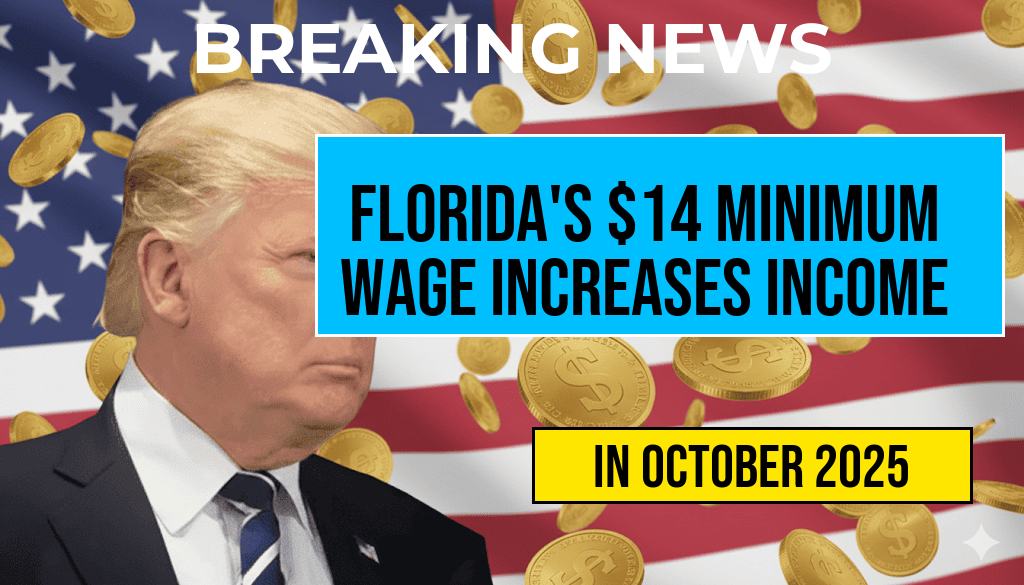Florida’s recent increase to a minimum wage of fourteen dollars per hour has sparked significant discussion among workers, business owners, and policymakers alike. Effective from January 1, 2024, this adjustment marks a notable milestone in the state’s labor policies, representing a $1 increase from the previous $13 hourly rate. For full-time employees working 40 hours a week, this translates into an annual income boost of over $2,000, providing tangible financial relief amid inflationary pressures. This change aims to improve living standards for low-wage workers across Florida, which boasts a diverse economy ranging from tourism to healthcare. As the state continues to attract new residents and businesses, advocates argue that a higher minimum wage supports economic stability and reduces income inequality, while critics express concerns over potential impacts on employment and business costs.
Details of the Wage Increase and Its Economic Context
Implementation and Scope
- The new minimum wage of $14 per hour applies to all non-exempt employees in Florida, including those in retail, hospitality, and service sectors.
- The wage increase aligns with Florida’s phased approach, which gradually raises the minimum wage to $15 by 2026, as mandated by state law.
- Employers with 25 or fewer employees are allowed a one-year delay before implementing the full increase, but many are adopting the new rate early.
Impact on Full-Time Workers
| Hourly Wage Before Increase | Hourly Wage After Increase | Annual Income (40 hrs/week, 52 weeks) | Approximate Increase |
|---|---|---|---|
| $13 | $14 | $27,040 | $2,080 |
| $12 | $14 | $29,120 | $3,200 |
Based on the new minimum wage, a full-time worker earning $14 per hour will see an annual income increase of approximately $2,080, surpassing the previous earnings at $13 per hour. This boost provides a critical financial uplift for many households in Florida, especially in urban centers like Miami, Orlando, and Tampa, where the cost of living continues to rise.
Economic and Social Implications
Benefits for Workers and Local Economies
Proponents of the wage increase argue it will reduce poverty levels and stimulate local economies. Higher wages mean increased purchasing power for consumers, potentially boosting demand for goods and services. According to economic analysts, this can lead to job retention and even create new employment opportunities, as businesses adjust to higher labor costs by investing in efficiency or automation.
Research from organizations such as the Wikipedia page on minimum wage highlights that moderate increases tend to have minimal negative effects on employment, especially when balanced with economic growth. Florida’s economy, characterized by a large service sector, stands to benefit from a more financially secure workforce.
Concerns and Criticisms
However, some critics caution against rapid wage hikes, warning they could lead to increased prices for consumers or layoffs in vulnerable sectors. Small business owners, in particular, express worry about the added financial burden, especially in industries with thin profit margins. The Florida Retail Federation and other industry groups have called for careful monitoring of the wage policy’s impacts.
Broader Policy Framework and Future Outlook
Legislative Backing and Legal Framework
The wage increase is part of Florida’s state legislation passed in 2022, which sets a path toward a $15 minimum wage by 2026. The law aims to gradually phase in higher wages while providing flexibility for small businesses. It also includes provisions for annual adjustments tied to inflation, ensuring wages keep pace with economic changes.
Projected Economic Trends
- Economic growth rates are expected to remain steady, with increased consumer spending supporting local businesses.
- Labor market participation could see shifts as more workers are incentivized to seek full-time employment with higher wages.
- Inflationary pressures may moderate as wage growth helps balance rising costs for essential goods and services.
As Florida continues to evolve as an economic hub, policymakers will likely monitor the effects of the wage increase closely, adjusting strategies to promote sustainable growth and equitable prosperity. For further insights into Florida’s labor policies and economic outlook, sources such as Forbes and the Wikipedia page on Florida’s economy offer comprehensive analysis and updates.
Frequently Asked Questions
What is the new minimum wage in Florida?
The new minimum wage in Florida is now set at fourteen dollars per hour.
How will the wage increase affect full-time workers’ annual income?
Full-time workers will see their annual income increase by over two thousand dollars due to the wage boost.
When did the Florida minimum wage increase take effect?
The wage increase took effect on October 1, 2023.
Who is affected by the new minimum wage?
The increase primarily benefits full-time workers across various industries earning close to the minimum wage.
Are there plans for future minimum wage increases in Florida?
Yes, Florida has plans to continue adjusting the minimum wage annually to keep pace with inflation and economic conditions.








